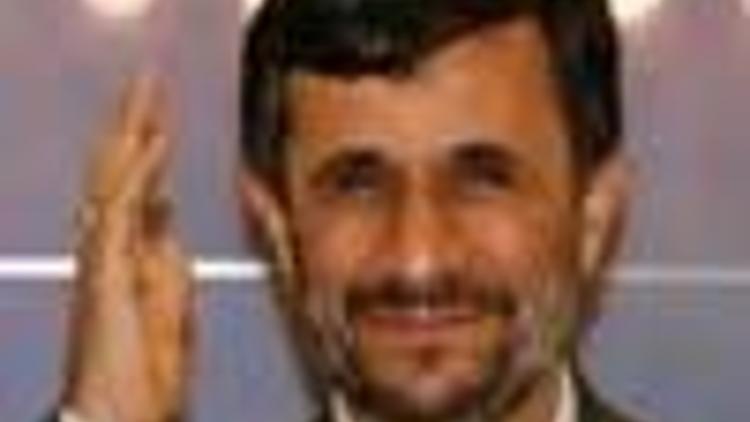Hurriyet English with wires
Oluşturulma Tarihi: Ağustos 15, 2008 11:32
Iranian President Mahmoud Ahmadinejad said on Friday he hoped his country and Turkey would soon sign deals, opposed by Washington, in the natural gas and electricity sectors on the second day of his key visit to Istanbul. He later met with Turkish Prime Minister Tayyip Erdogan. (UPDATED)
"We have reached important agreements on natural gas and electricity issues. God willing we will complete them as soon as possible," told Ahmadinejad speaking a meeting at a forum in Istanbul
"As you know, issues like natural gas and petroleum need investment and talks on these issues may take a long time," he added.
The United States has voiced its opposition to the energy deal amid a standoff between Iran and Western countries and is trying to isolate the Islamic republic over fears it is pursuing a secret nuclear weapons program. Tehran denies this. �
Some news reports suggested the failure to reach agreement on the energy deals came after pressure from the United States, while some reports attributed it to new demands from Iran, including pricing and investment. �
Turkey and Iran agreed in May to build a new gas pipeline to ensure a reliable supply to Turkey. Ahmad Noorani, an official at the Iranian Embassy in Ankara, said last week the deal could be signed during the visit.
Signing the $3.5 billion agreement to provide Turkey with Iranian natural gas - on which�memoranda of understanding had already been agreed - was to have been the crowning achievement of Ahmadinejad's two-day visit to Istanbul, which Turkish officials had agreed to after intense Iranian lobbying.
Iran is Turkey's second-biggest energy supplier after Russia and has been seeking to woo Turkish investment in its South Pars gas fields.
But as Ahmadinejad met his Turkish counterpart, Abdullah Gul, at Ciragan Palace in Istanbul on Thursday, it emerged that U.S. intervention had effectively torpedoed a deal.
Rather than unveiling the expected landmark agreement, a press conference by the two leaders last night merely yielded a joint statement in which the countries "reiterated their desire for on-going cooperation".
A western diplomatic source told the Guardian that Turkey had pledged not to sign any major energy deals with Iran in return for Washington's blessing for Ahmadinejad's visit after Bush administration officials privately criticized it.
"Steve Hadley (the U.S. national security adviser) voiced objections to Ahmadinejad's trip when he visited Ankara a month ago," the source said. Hadley had visited Turkey in July.
"The attitude was, we've allowed them to host (Iranian Foreign Minister Manouchehr) Mottaki and (Iran's top nuclear negotiator Saeed) Jalili, but having Ahmadinejad was sending the wrong signal.
"However, the Turks explained that he had been pressing for a visit to Turkey for a while and that they couldn't say no any longer. To meet American reservations, they promised they wouldn't sign any major energy deals, apart from maybe something on electricity, and would pressure Ahmadinejad to accept the U.N. security council incentive package in exchange for suspending uranium enrichment," the Guardian quoted the diplomatic official as saying.
U.S. WITHDRAWALRegional nations should fill the security vacuum when the U.S. withdraws its troops from Iraq - but said there was no prospect of sending in Iranian forces, Ahmadinejad told Friday's forum.The United States and Iraq have worked on a deal this year to try to ensure Iraqi security but have disagreed on timing for American troops to withdraw. Iraq has insisted on a timetable but U.S. President George W. Bush has refused to accept one.
"The United States will soon leave the region, then regional countries should fill the security vacuum, there is no need for interference of other countries," Ahmadinejad said.
U.S. and Iraqi negotiators missed a July 31 target date for completing a security deal amid disagreement over U.S. troop withdrawals. Iraq’s Shiite-led government believes a schedule is essential to win approval for a security deal in parliament.
Ahmadinejad said Iraq’s "stability and territorial integrity," was important for Iran. "We all have to protect the state of Iraq."
When asked if this meant Iranian troops would go into Iraq after U.S. forces leave, Ahmadinejad said he has never said such a thing.MEETING WITH TURKISH PM
The Iranian president met on Friday the Turkish Prime Minister Tayyip Erdogan at Istanbul's Ciragan Palace after he visited the city's famous Blue Mosque to pray.
Turkish Foreign Minister Ali Babacan, Energy Minister Hilmi Guler and Iranian Foreign Manuchehr Mottaki also attended the meeting.
Ahmadinejad will depart from Turkey later in the day.
NUCLEAR STANDOFF
Turkey favored a diplomatic solution to the problem regarding Iran's nuclear program, Gul told Thursday a joint press conference with Ahmadinejad after their meeting. "The solution should take into consideration the uneasiness of the international community as well as protecting Iran's legitimate rights within the scope of the treaty on the non-proliferation of nuclear weapons," he said.
"We expect the negotiation process to continue with the good will of all parties... and reach a positive outcome in a short term," Gul said, pledging Turkey's assistance to help the negotiations.
Iran is open to dialogue to resolve the standoff on its nuclear program, but will not give up its right to possess atomic energy, Ahmadinejad told Thursday's conference.
"We believe that dialogue is the best way to resolve the issue and we are always ready for dialogue," he said. But negotiations had to take into account Iran’s right to develop nuclear energy technology, he added.
"Those who do not respect that will lose themselves. There will be no change in the will of the Iranian people," said Ahmadinejad.
Western powers suspect Tehran’s nuclear program is a cover for the development of the atomic bomb, but Ahmadinejad said the allegations were a reflection of Washington’s "ill will" towards Tehran.
Iran is risking a possible fourth round of U.N. sanctions after it failed to give a clear response to an incentives package offered by six major world powers in return for halting its uranium enrichment activities.


